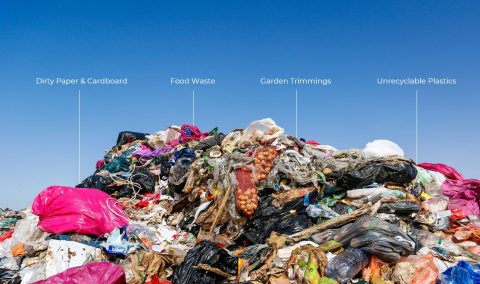The Process
UBQ Materials offers a solution to the growing waste crisis by unlocking the hidden value of waste. UBQ™ is converted from 100% unsorted household waste diverted from landfill – everything from food residues and mixed plastics to cardboard, paper, and even dirty diapers. Metals and minerals, which have high recyclability, are removed and sent over to traditional recycling streams. All that remains is transformed into UBQ™ – so nothing goes to waste.

The patented UBQ conversion process begins with the receipt of residual solid municipal waste, landfill-destined waste previously considered unrecyclable. The vast majority of household waste consists of organic materials. UBQ’s advanced waste conversion technology breaks them down to their basic particulate constructs—lignin, cellulose, fibers, and sugars—and then reassembles them into a matrix. The remaining mixed plastics are melted and bound into the matrix to create UBQ™, a composite thermoplastic material.
Watch Nobel Prize winner Prof. Roger Kornberg explain the UBQ process in a nutshell.
Unlike recycling, which requires a sophisticated infrastructure of separating and sorting into homogenous waste streams, UBQ uses all of the waste in a single, heterogeneous stream.
The UBQ conversion process was developed to have ZERO impact, with a relatively small amount of energy and no production waste, effluents or use of water.
UBQ™ is not a plastic treatment or recycling technology; it is a holistic process complementary to these methods. UBQ Materials addresses the waste crisis as a whole by functioning independently of recycling or waste management infrastructures in its resources, processes, and economics. The ability to convert organic household waste into sustainable bio-based material makes the UBQ process a novel, climate-positive approach that’s clean, recyclable, and cost-effective.
